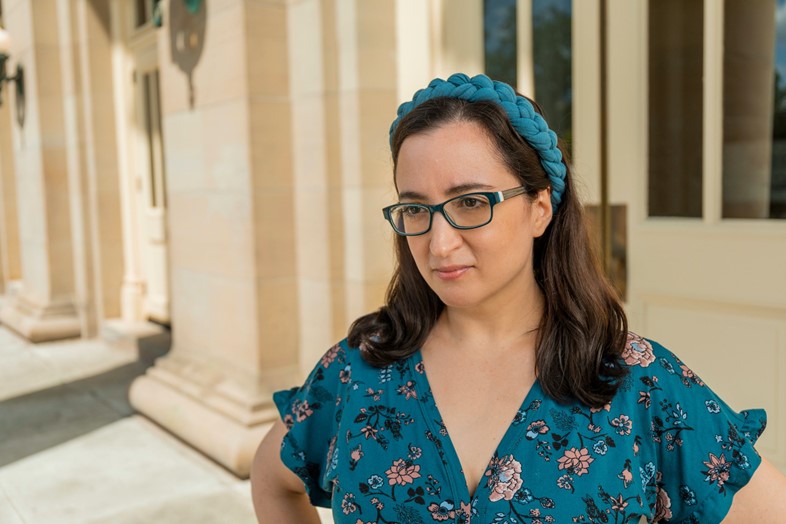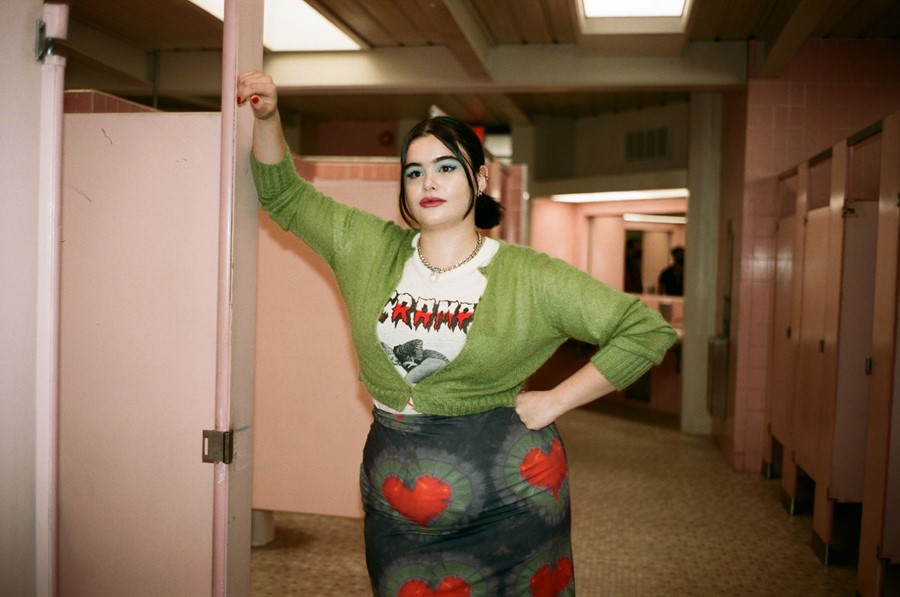In her new book Unshrinking, Kate Manne explores the systemic nature of fatphobia and how we can unlearn the damaging body standards we are taught from a young age
In the past week, five per cent of teenage girls have used a harmful weight-loss product without a prescription from a doctor. That’s one in 20. We live in a society that places a significant amount of value on thinness, and it’s clear the pressure to adhere to this ideal starts young. Fatphobia is present in nearly every aspect of our culture, from medical bias around weight to body shaming in advertising. And if it seems, on the surface, like there has been some progress since the bleak days of the early 2000s, that’s only because these messages have become more subtle and insidious – dressed up in the language of wellness and words like ‘detox’ and ‘cleanse’. In fact, since 2007, fatphobia is the only implicit bias that has become more extreme and prevalent.
Fatphobia and our collective desire to be smaller has long been a central aspect of capitalist culture – the average adult in the UK will spend over £20,000 on weight loss, while in the US more than $60 billion is spent annually by those trying to lose weight – but where does this come from? In a new book titled Unshrinking, feminist scholar and philosopher Kate Manne draws on both personal anecdotes and extensive research to illustrate how fatphobia persists and harms women. In Unshrinking, she recounts her experience of conforming to toxic diet culture, the profound transformation that comes from an acceptance of our bodies as existing for ourselves, and how fatness ought not to be demonised, but reclaimed as any other descriptor of our bodies.
By revealing the way that size discrimination shapes wealth inequalities, interpersonal prejudice, educational outcomes and medical neglect, Manne reveals that fatphobia is not just a feminist issue but a social justice issue. Instead of rehashing body positivity narratives that ignore the wider forces at play, Unshrinking calls for a dismantling of the forces that constrain us and asks us to demand a world that embraces all sizes. Here, we speak to her about the book.
Can you explain the concept of ‘unshrinking’ and what inspired you to explore the fight against fatphobia?
Kate Manne: I found that, as a feminist who’d written two books on misogyny, I was still trying desperately (until fairly recently) to shrink my body, and to hide from public scrutiny. When I had the opportunity to do publicity for my first book, for example, I turned down all TV interview requests, only appearing on camera when I could control the angle via Skype or similar. When I decided to stop dieting once and for all, and to make peace with my body, I came to think of my project as one of being ‘unshrinking’ – in both body size, by accepting that I’d become fatter, and by putting myself out there unapologetically.
My decision to stop dieting came about through reflecting on how harmful and toxic my own experiences with dieting were – I stopped eating altogether at one point – and that I am the rule, not the exception. Because, while it’s relatively easy to lose weight in the short term by dieting, studies show the weight comes back, nearly inexorably, for the vast majority of people. So I found myself realising I just couldn’t do this anymore. And I couldn’t model it for my young daughter. The resulting body peace has made me embrace both the way my body is – round, soft, ample – and my hunger, my appetite. I am no longer ashamed of either.
Your book emphasises the role of language in perpetuating fatphobia. Could you share specific examples and strategies to combat harmful language surrounding body size?
Kate Manne: Yes, I think one of the common mistakes in this arena is to go for medicalising, stigmatising terms like ‘overweight’ and ‘obese’, which depict fatness as a defect, a pathology, something to be corrected, rather than just the way some of our bodies are. Bodies come in a wide range of shapes and sizes, and I think building the assumption that someone in a larger body is necessarily unhealthy or doomed to live an unhappy life into our language can be harmful. So, in the tradition of fat activism, my view is that ‘fat’ should be reclaimed as a merely neutral description of some bodies, much like ‘short,’ ‘tall,’ or ‘thin,’ for that matter. I’m also not a huge fan of euphemisms like ‘fluffy,’ ‘curvy,’ and so on, which might be helpful for some people, but feel a little bit coy, like they’re making fatness something unmentionable.
The intersectionality of fatphobia is a key theme in your work. How do the compounding effects of discrimination based on both weight and factors like race, class and ability affect our experiences of fatphobia?
Kate Manne: That was a huge part of the book, because I think that, as well as recognising fatphobia as a systemic form of oppression, we can’t fully address other forms – including racism, misogyny, classism, ableism, and transphobia – without also addressing fatphobia. For one example, I draw on work by the sociologist Sabrina Strings to trace fatphobia’s history to anti-Blackness, and also show how it is particularly wielded against Black people today, drawing on work by Da’Shaun Harrison, who looked at police brutality toward large Black men who are depicted as ‘beastly’ – sometimes with tragic outcomes.
Can you discuss any personal experiences or anecdotes that influenced your perspective on fatphobia and motivated you to write Unshrinking?
Kate Manne: I was a moderately chubby girl who was mercilessly teased for my body, especially when I started attending an all-boys school at age 16, the year it integrated by admitting just three girls. I had ‘fat bitch’ scrawled on my locker, and was voted the person most likely to have to pay for sex at the high school leavers’ assembly. Those experiences were very painful, and they made me sensitive to both misogyny and fatphobia, and interested in their intersection when I finally had the words for these social ills. My view is that misogyny takes a hierarchy, any hierarchy, and derogates a girl or woman in terms of it: we value intelligence, so call her stupid. We value niceness, so call her a bitch. We value sexual purity, so call her a slut. We value thinness, so call her fat, understood as one of the worst things you could possibly be.
What role do women and girls play in reproducing fatphobia? How can we unlearn the fatphobic body standards we’ve been taught?
Kate Manne: I think that, unfortunately, girls and women play a major role in perpetuating fatphobia, by policing not only their own bodies but also that of other girls and women. The way to look at it is that misogyny doesn’t just direct monolithic hatred toward girls and women: it sets up a distinction between ‘good’ women and ‘bad’ ones, and punishes the latter. One way of being a ‘bad’ woman, according to patriarchal norms and expectations, is being fat. So some girls and women tend to be intensely invested in being thin themselves, and being thinner – and thus ‘better’ – than others. Or, if they’re invested in the social status of a child or a friend, they may try to get them to lose weight or remain thin. ‘Almond moms’ are a real and harmful phenomenon. On the other hand, I want to be clear: fathers as well as mothers play a major role in perpetuating fatphobia, by policing their daughters’ bodies, labelling them as overweight, or putting them on a diet. We know those are major risk factors for her developing an eating disorder.

Your book explores the systemic nature of fatphobia. What structural changes do you believe are necessary to create a more inclusive and accepting society? How can we collectively tackle fatphobia at the root?
Kate Manne: I think we need to focus on major structural changes in order to make the world accessible and humane to all people, whatever their size. That includes reducing interpersonal hostility, and practising inclusivity and kindness, but also accessibility and an end to institutional forms of fatphobia: by making the medical system equitable, reducing weight stigma in all sectors, combating discrimination in employment, and addressing both bullying and teacher discrimination against larger children. I think this will be a difficult and long battle, but there are many small things we can do to fight it – from standing up for those who live in larger bodies, to teaching our children that their value is not dependent on their body size, and even to not trying to shrink ourselves, as hard as that can be.
I know that many people get hung up on the ‘health’ piece of the picture and press on the question whether fatness is unhealthy. Even though better questions would be whether fatness is reversible, or preventable, in ways that aren’t themselves quite risky and potentially unhealthy – by setting people up for weight cycling and subsequent metabolic problems, and eating disorders, among other things. On my reading of the empirical evidence, the relationship between weight and health is a complicated matter and some of the health risks for fat people have been exaggerated.
What’s more, although there are correlations between being heavier than that and having various health problems, the fact that fat people get such inadequate medical care and are subject to such stigma, which has demonstrably bad health effects, means that we should be open-minded about how much sheer fatness is causing these outcomes, and how much is mere correlation. However this issue shakes out though, the important thing to hang onto here is that, whatever your health status, and whatever the size of your body, you deserve to be included. You deserve to be treated with dignity and respect, and not belittled for being a larger person. I wish that was an uncontroversial conclusion – but sadly, we have a long way to go before we get there as a society.




